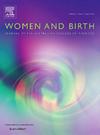A “better service” promoting “better experiences”: Midwives' experiences working in a caseload service for women of refugee backgrounds
IF 4.1
2区 医学
Q1 NURSING
引用次数: 0
Abstract
Background
Women of refugee backgrounds living in high-income countries experience health inequities. One contributing factor is maternity services that are unresponsive to their particular needs. In 2016, after a service evaluation identified significant issues, an Australian tertiary hospital redesigned a service for women of refugee backgrounds by incorporating continuity of midwifery carer with 24/7 phone access to midwives and interpreters. Midwives provided group antenatal care at a community venue with an onsite social worker, interpreters, and postnatal care at home. There is a dearth of literature describing midwives’ experiences of working in such services.
Aim
To explore and describe midwives’ experiences and perceptions of working at a dedicated Refugee Caseload Midwifery Group Practice service (RMGP).
Methods
One focus group and five one-on-one online interviews were conducted between 12 and 30 July 2021 with eight midwives working, or previously working, at the service. Reflexive thematic analysis interpreted midwives’ work perspectives and experiences.
Findings
Themes included 1) Accessible and responsive care, 2) Understanding and valuing women’s needs, and 3) Strong partnerships. Our findings suggest that the RMGP service promoted equity-oriented care by contextually tailoring care to meet women’s cultural and logistical needs. The service components were responsive to women’s needs, promoting easier access to care. However, midwives lacked adequate support to provide trauma-informed care.
Conclusion
The RMGP service promotes accessible care and is an excellent example of a service that provides equity-oriented care for women of refugee backgrounds. Effective training in trauma-informed care will enhance midwives’ provision of quality care.
“更好的服务”促进“更好的体验”:助产士为难民背景的妇女提供个案处理服务的经验
生活在高收入国家的难民背景妇女面临卫生不平等。一个促成因素是产妇服务不能满足她们的特殊需要。2016年,在一次服务评估中发现了一些重大问题后,澳大利亚一家三级医院重新设计了一项针对难民背景妇女的服务,将助产护理人员的连续性与助产士和口译员的24/7电话联系结合起来。助产士在社区场所提供集体产前护理,现场有社会工作者、口译员,并在家中提供产后护理。描述助产士在此类服务中工作经历的文献很少。目的探讨和描述助产士在专门的难民案件助产小组实践服务(RMGP)工作的经验和看法。方法在2021年7月12日至30日期间,对8名在该院工作或曾在该院工作的助产士进行了1次焦点小组调查和5次一对一在线访谈。反身性专题分析解释了助产士的工作视角和经验。调查结果主题包括:1)无障碍和响应性护理;2)理解和重视妇女需求;3)牢固的伙伴关系。我们的研究结果表明,RMGP服务通过根据具体情况定制护理来满足女性的文化和后勤需求,从而促进了公平导向的护理。服务组成部分响应妇女的需要,促进更容易获得护理。然而,助产士缺乏足够的支持来提供创伤知情护理。RMGP服务促进了可获得的护理,是为难民背景的妇女提供以平等为导向的护理服务的一个很好的例子。创伤知情护理方面的有效培训将提高助产士提供高质量护理的能力。
本文章由计算机程序翻译,如有差异,请以英文原文为准。
求助全文
约1分钟内获得全文
求助全文
来源期刊

Women and Birth
NURSING-OBSTETRICS & GYNECOLOGY
CiteScore
7.20
自引率
13.20%
发文量
371
审稿时长
27 days
期刊介绍:
Women and Birth is the official journal of the Australian College of Midwives (ACM). It is a midwifery journal that publishes on all matters that affect women and birth, from pre-conceptual counselling, through pregnancy, birth, and the first six weeks postnatal. All papers accepted will draw from and contribute to the relevant contemporary research, policy and/or theoretical literature. We seek research papers, quality assurances papers (with ethical approval) discussion papers, clinical practice papers, case studies and original literature reviews.
Our women-centred focus is inclusive of the family, fetus and newborn, both well and sick, and covers both healthy and complex pregnancies and births. The journal seeks papers that take a woman-centred focus on maternity services, epidemiology, primary health care, reproductive psycho/physiology, midwifery practice, theory, research, education, management and leadership. We also seek relevant papers on maternal mental health and neonatal well-being, natural and complementary therapies, local, national and international policy, management, politics, economics and societal and cultural issues as they affect childbearing women and their families. Topics may include, where appropriate, neonatal care, child and family health, women’s health, related to pregnancy, birth and the postpartum, including lactation. Interprofessional papers relevant to midwifery are welcome. Articles are double blind peer-reviewed, primarily by experts in the field of the submitted work.
 求助内容:
求助内容: 应助结果提醒方式:
应助结果提醒方式:


